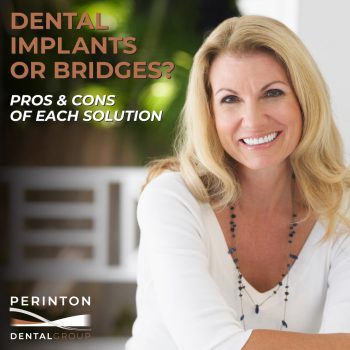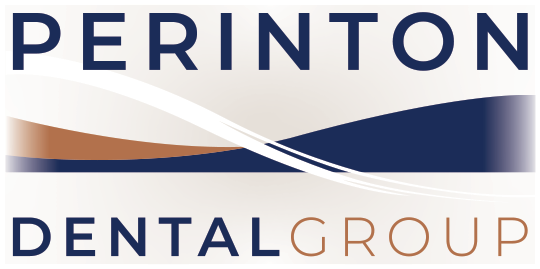Community

Dental Implants or Bridges? Pros & Cons of Each Solution
 Losing a tooth can impact more than just your smile—it can affect your bite, speech, confidence, and overall oral health. Fortunately, modern dentistry offers excellent solutions to replace missing teeth. The two most common options are dental implants and dental bridges, each with its benefits and considerations.
Losing a tooth can impact more than just your smile—it can affect your bite, speech, confidence, and overall oral health. Fortunately, modern dentistry offers excellent solutions to replace missing teeth. The two most common options are dental implants and dental bridges, each with its benefits and considerations.
If you’re in Fairport, NY, and trying to decide between implants and bridges, Perinton Dental Group is here to help you understand the differences and choose the best path forward for your smile.
Understanding Tooth Replacement Options
Before diving into the pros and cons, it’s helpful to understand what each option is.
What are Dental Implants?
Dental implants are titanium posts surgically placed into the jawbone to act as artificial tooth roots. Once healed, a crown is placed on top to create a natural-looking replacement tooth. Implants can replace a single tooth, multiple teeth, or even support full dentures.
What are Dental Bridges?
A dental bridge is a fixed restoration that “bridges” the gap left by a missing tooth. It uses the adjacent teeth as anchors to hold an artificial tooth in place. Bridges can be made of porcelain, ceramic, or metal, and are commonly used for one or two missing teeth in a row.
Dental Implants: A Detailed Look
The Advantages of Dental Implants
- Longevity and Durability: Implants are designed to last for decades—often a lifetime—with proper care. They’re anchored into the jaw, making them incredibly stable and strong.
- Natural Look and Feel: Implants function and feel like real teeth. Because they integrate with your bone, they offer the most lifelike solution in terms of appearance and bite.
- Bone Health Benefits: Implants stimulate the jawbone, helping to prevent bone loss that can occur when a tooth is missing.
- Easy Maintenance: Caring for implants is just like caring for your natural teeth—daily brushing, flossing, and regular dental checkups.
The Disadvantages of Dental Implants
- Higher Initial Cost: Implants tend to cost more upfront than bridges. However, their longevity often makes them more cost-effective over time.
- Lengthy Treatment Process: From consultation to placement and healing, implants can take several months to complete.
- Surgical Procedure: Because implants involve surgery, patients need to be in good general health and have sufficient jawbone density.
Dental Bridges: A Detailed Look
The Advantages of Dental Bridges
- Lower Initial Cost: Bridges typically cost less upfront than dental implants, making them a more budget-friendly option initially.
- Faster Treatment Time: Most bridges can be completed within a few weeks, compared to several months for implants.
- Non-Surgical Option: For those who want to avoid surgery or aren’t good candidates for implants, bridges offer a non-invasive alternative.
The Disadvantages of Dental Bridges
- Requires Altering Adjacent Teeth: To support the bridge, neighboring teeth must be filed down—this can compromise their long-term health.
- Shorter Lifespan Compared to Implants: While bridges can last 10–15 years with good care, they typically don’t last as long as implants.
- Potential for Decay and Bone Loss: Since bridges don’t replace the tooth root, they don’t prevent bone loss beneath the missing tooth. Food and plaque can also collect beneath the bridge, increasing the risk of decay.
- Less Natural Feel: Bridges sit above the gums and may not feel as seamless or natural as implants.
Dental Implants vs. Bridges: A Side-by-Side Comparison
Cost Comparison
- Bridges: Lower initial cost
- Implants: Higher initial investment, but often lower lifetime cost due to longevity
Longevity Comparison
- Bridges: 10–15 years
- Implants: 20+ years or more with proper care
Maintenance Comparison
- Bridges: Extra care is needed to clean under the bridge
- Implants: Brush and floss like natural teeth
Aesthetic Comparison
- Bridges: Natural-looking, but may not match the feel of real teeth
- Implants: Mimic the look, feel, and function of real teeth
Impact on Adjacent Teeth
- Bridges: Requires modification of surrounding teeth
- Implants: Stand alone without affecting nearby teeth
Am I a Good Candidate for Dental Implants?
You may be a candidate for dental implants if you:
- Are in good general health
- Have healthy gums
- Have adequate jawbone density
- Don’t smoke or are willing to quit
A consultation at Perinton Dental Group includes a thorough exam and digital imaging to assess your eligibility.
Am I a Good Candidate for a Dental Bridge?
Dental bridges may be the right solution if you:
- Want to avoid surgery
- Are missing one or two adjacent teeth
- Have healthy adjacent teeth to support the bridge
- Prefer a quicker treatment process
Choosing the Right Option for You: Factors to Consider
- Number of Missing Teeth: A single missing tooth may be better suited for an implant while multiple adjacent missing teeth may work well with a bridge.
- Overall Health: Surgical patients should be healthy and free from conditions that affect healing.
- Budget: Bridges are more budget-friendly upfront. Implants may be more economical in the long run.
- Bone Density: Implants require adequate bone support. If bone loss has occurred, a graft may be necessary.
Perinton Dental Group: Your Tooth Replacement Experts in Fairport, NY
At Perinton Dental Group, we offer both dental implants and bridges, using advanced technology and patient-centered care to restore your smile with confidence. We’ll help you weigh your options and build a treatment plan tailored to your goals, health, and budget.
Schedule a Consultation Today!
Missing a tooth? Let’s fix that. Contact Perinton Dental Group in Fairport, NY, today to schedule your consultation. Whether you’re leaning toward dental implants or bridges, our team is here to answer your questions and get you smiling again, comfortably and confidently.
Disclaimer: The content of this blog is not intended to be a substitute for professional medical advice, diagnosis, or treatment. Always seek the advice of qualified health providers with questions you may have regarding medical conditions.
